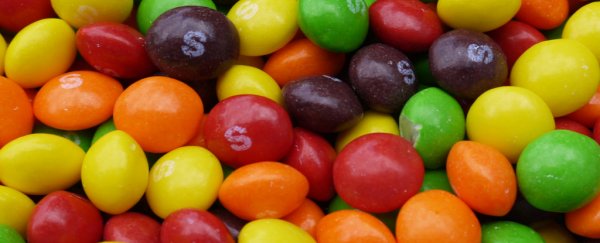A US citizen is suing the sweets company Mars over their continued use of a potentially toxic nanoparticle as an ingredient in Skittles.
The class action lawsuit, which was filed last week in California by Jenile Thames and others, claims that Mars failed to adequately warn customers about the chemical, titanium dioxide, that is "unfit for human consumption" and therefore committed a fraud of omission.
Mars says that Skittles are made in accordance with FDA regulations, which permit the use of titanium dioxide at less than one percent of the food's dried weight, and that the company has done nothing wrong.
Titanium dioxide (TiO2) is a white coloring agent that is commonly used in confectionery, pastries, cake decorations, candles, toothpaste, cosmetics, paints, and paper.
As of March this year, titanium dioxide has been banned as a food additive in Europe due to concerns around genotoxicity (damage to DNA that can cause cancer) and uncertainty over how much was safe to consume. Around half of titanium dioxide particles fall into the nano range (less than 100 nanometers wide).
In 2016, Mars issued a statement saying it would phase out the use of artificial coloring over five years, and later clarified this included titanium dioxide.
The Washington Post reports the lawsuit claims that Mars "flouted its own promise to consumers" as "more than six years later, Defendant continues to sell the Products with [titanium dioxide] unbeknownst to reasonable consumers who purchase the Products".
The lawsuit alleges that Mars did not alert consumers to the risks of eating a sweet that contained titanium dioxide.
"Defendant relies on the ingredient list which is provided in minuscule print on the back of the Products, the reading of which is made even more challenging by the lack of contrast in color between the font and packaging," the lawsuit claims.
Other brightly colored candy brands such as Sour Patch Kids, Swedish Fish, and Nerds do not contain titanium dioxide, the lawsuit says.
European food manufacturers have until August to phase out the use of this chemical. Europe's decision was based on an analysis of thousands of studies in mice and rats compiled by the European Food Safety Authority, which suggest that titanium dioxide mostly passes straight through the body, but low amounts of the particle are absorbed.
As the chemical could accumulate in the body over time, the European Food Safety Authority said they could not rule out genotoxic effects.
The UK's Food Standards Agency has decided not to ban titanium dioxide in foods, having reviewed the European decision and found that there were too many limitations and uncertainties in the cited studies to support the conclusions made.
The UK agency said the wording of Europeans' conclusion was "not helpful" in communicating risk and may cause unnecessary concern for the public, but do state that better data is required for a more accurate assessment.
The Australian Food Authority is still looking into the issue.
The conclusions from one mouse study linking titanium dioxide to cancer have already been dismissed by the Australian Food Authority on the basis of deficiencies in the design of the study, but the authority is planning a more comprehensive review.
